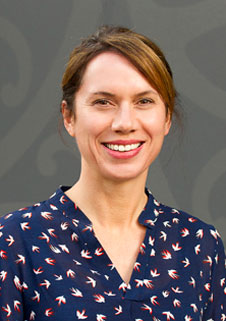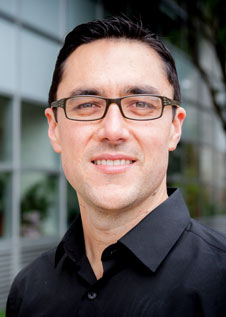 Monday 30 April 2018 2:25pm
Monday 30 April 2018 2:25pmTwo University of Otago researchers of Ngāpuhi descent are being rewarded with new prestigious four-year fellowships aimed at providing better health and well-being for Māori.
National Centre for Lifecourse Research (NCLR) co-director Dr Reremoana (Moana) Theodore has secured one of two inaugural $500,000 Māori Health Research Emerging Leader Fellowships.
Senior Research Fellow and epidemiologist Dr Jason Gurney has also secured one of the awards, which are managed and jointly awarded by the Health Research Council and the Ministry of Health.

Dr Reremoana (Moana) Theodore
Dr Theodore's fellowship includes three separate pieces of longitudinal research, which will all be undertaken at the NCLR.
The first project will focus on the benefits of kaupapa Māori early childhood education for tamariki and their whānau over time. This project is a part of the larger Te Kura Mai i Tawhiti research project, run by Taranaki Māori community group Te Pou Tiringa and the NCLR.
Using large administrative data sets, the second piece of longitudinal research will look at the impact of education on the well-being of young Māori. The final project will track Māori university students and analyse the benefits of a tertiary education to their health and well-being.
For Dr Theodore, the three strands of research based from early childhood to tertiary education are bound by a desire to improve Māori health and well-being.
“Lifecourse research is being used to inform government policies and investment in well-being, but there has been limited Māori lifecourse research to date to inform programmes that will make a difference for Māori over time,” Dr Theodore says.
Dr Theodore hopes the fellowship will raise awareness around the importance of longitudinal studies led by Māori researchers.
“At the moment we see inequalities in health and well-being outcomes for Māori that begin in pregnancy and go through to old age, or across generations,” Dr Theodore says.
Fellow Co-Director of the NCLR and Director of the HRC-funded Dunedin Multidisciplinary Health and Development Study, Professor Richie Poulton says: "the support that this HRC fellowship will provide is really important because Moana is someone that I consider to be a future lifecourse research leader in New Zealand.”
“Her research will help us to understand what supports positive Māori outcomes beginning in early life throughout the lifecourse," Professor Poulton says.

Dr Jason Gurney
Meanwhile, Dr Gurney will be examining strategies to help the quantity and quality of life for Māori cancer patients.
There is some research suggesting Māori are 20 per cent more likely to develop cancer, but nearly 80 per cent more likely to die from it. It has also been estimated that Māori patients with terminal cancer are more likely to experience a poor quality of life and palliative care.
Over the next four years, Dr Gurney wants to identify the most important cancer priorities for Māori. He then wants to put together an action plan around how best to tackle these priorities, including the development of a policy discussion document to help shape health strategies for Māori.
Dr Gurney says he is excited about a fellowship that he believes could have quite a significant long term impact on Māori health.
“We need to take a systematic approach to tackling the profound problem that we have with Māori cancer outcomes, and I want to be part of that conversation,” Dr Gurney says.
“This fellowship provides an opportunity to focus on solutions to this problem. So let's line up some priorities, and let's tackle them.”
For more information, contact:
Dr Reremoana (Moana) Theodore
Co-Director
National Centre for Lifecourse Research
Mob 021 261 0023
Email moana.theodore@otago.ac.nz
Dr Jason Gurney
Senior Research Fellow
Cancer Control and Screening Research Group
Mob 021 279 3597
Email jason.gurney@otago.ac.nz
Mr Stacey Pene
Senior Manager, Māori Health Research Investment
Health Research Council
Tel 09 303 5225
A list of Otago experts available for media comment is available elsewhere on this website.
Electronic addresses (including email accounts, instant messaging services, or telephone accounts) published on this page are for the sole purpose of contact with the individuals concerned, in their capacity as officers, employees or students of the University of Otago, or their respective organisation. Publication of any such electronic address is not to be taken as consent to receive unsolicited commercial electronic messages by the address holder.